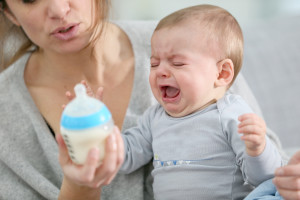Easing Gas Pain in Babies
Gas – we all have it, and newborns are no exception.
 Due to access air swallowed when feeding, crying, and sucking on a pacifier, babies tend to be gassier than toddlers and older children. Because babies can’t limit the intake of air, they may pass gas more often. While passing gas is normal, it can lead to uncomfortable pain. Babies can’t communicate to let you know when they are feeling discomfort, so always be on the lookout for gas pain or other discomfort. Oftentimes, small adjustments with feeding can alleviate issues with gas.
Due to access air swallowed when feeding, crying, and sucking on a pacifier, babies tend to be gassier than toddlers and older children. Because babies can’t limit the intake of air, they may pass gas more often. While passing gas is normal, it can lead to uncomfortable pain. Babies can’t communicate to let you know when they are feeling discomfort, so always be on the lookout for gas pain or other discomfort. Oftentimes, small adjustments with feeding can alleviate issues with gas.
The following list provides at-home strategies to ease gas pain in your baby.
- Find the best feeding position. The majority of gas pain occurs because your baby ingests too much air. In order to limit the amount of air your baby intakes, focus on the position of your baby’s head when feeding. Work to keep the head raised above the stomach. Elevating the head allows the milk to fall to the bottom of the stomach, letting the air rise to the top, which makes it easier for your baby to burp access air bubbles.
- Be aware of bubbles in bottles. If you are warming a breast milk bottle and shake it up, you will create air bubbles in the milk. Formula requires shaking, so air bubbles build up in those bottles as well. Simple allow the bottle to settle for a few minutes before feeding as this should eliminate most of the bubbles and decrease air ingestion.
- Select the proper nipple. When bottle feeding, always use a low-flow nipple to reduce the amount of air ingested while feeding. Additionally, be sure the entire nipple fills with milk or formula before administering the bottle to your baby, as air caught in the nipple may accidentally be fed to your baby.
- Take occasional burping breaks. Longer breaks are suggested if your baby doesn’t burp that time around. To ensure your baby burbs in each cycle, take breaks and lay him/her on their back for a few moments and then try burping again.
- Massage your baby’s tummy. In addition to limiting air intake, massaging can provide relief. Tummy time and gentle stomach massage can help the gas pass.
- If breastfeeding, examine your diet. It is true that some foods that mom’s ingest might cause more gas for baby. What foods do you eat that may cause gas? Dairy products and caffeine may irritate your baby’s stomach. Do you notice more gas after you’ve had onions, broccoli or garlic? Additionally, as your baby moves on to juices and solid foods, some babies have trouble digesting the sugar alcohols found in some fruits.
When should you seek professional help?
If your baby is particularly fussy and at-home tactics for feeding aren’t enough, it may be time to consult your doctor. Additionally, if your baby has a fever or vomiting or bowl movement issues, following up with your child’s pediatrician is best.
